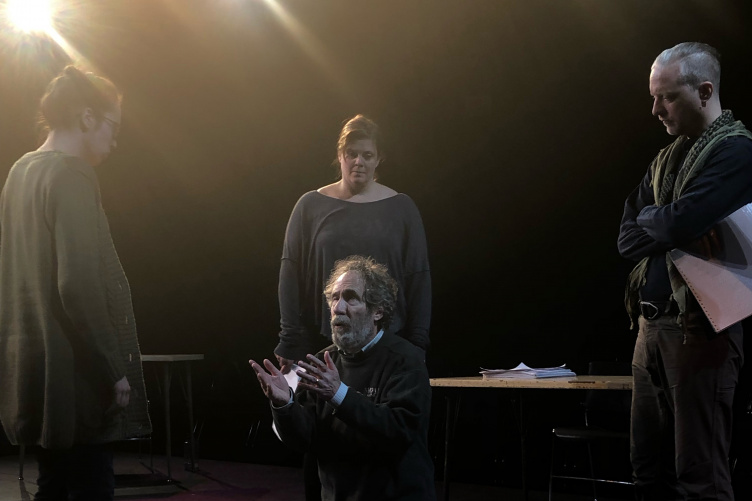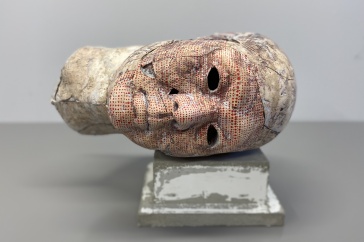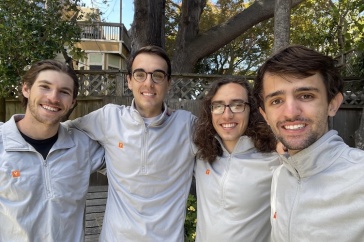
David Richman rehearses his new play "Lives of Tiresias," coming to the Hennessy Theatre Jan. 25-27. Photo by Morgan Simmons '19
He was the most famous blind man in mythology, and his fictional life has inspired dozens of works and spanned centuries. Now, thanks to an original play by David Richman, an ancient prophet is coming to life on stage at UNH, bringing lessons from the past into the present.
Sitting in his office in Paul Creative Arts Center adjacent to a wing of the music department's practice rooms, Richman shares his story. His voice is rich and resonant. The muted mingling of a violin’s somber tune and a soprano’s soaring melody emanate from those rehearsal spaces, providing an appropriate accompaniment.
See “Lives of Tiresias”
Where: UNH’s Hennessy Theatre
When: Jan. 25 and 26 at 8 p.m. and Jan. 27 at 6 p.m.
Cost: Free
Learn more about the initial production.
“Lives of Tiresias,” he explains, examines several key questions: “What does it mean to have sight, insight, no sight? What does it mean to have lived and loved in the body of a man and of a woman? Why did generations of Theban kings reject Tiresias's advice, and would he have done better as an advisor had he been living in our own turbulent times?”
Richman, who is a professor of theatre and of humanities, explains how this play that “charts the uncanny and failed career of Tiresias, the blind prophet of Thebes” came to be. About five years ago, he received an email from a former student working in New York City that led to a connection with Cecilia Rubino of The New School. Following his work with her on a film about Shakespeare and memory, Richman asked Rubino if she would be interested in collaborating with him on a project for his sabbatical this past spring. Rubino agreed, suggesting that after teaching theatre for 40 years, he must certainly have a play to write.
Richman smiles, recalling his hesitation at first, and his wife’s response to the idea: “You’ve been obsessed with Tiresias for years. Why not write that play?”
And so it began. Richman created and wrote the play during his spring sabbatical and performed a reading with several of his UNH theatre and dance colleagues in the Hennessy Theatre. He and Rubino then brought “Lives of Tiresias” to the Jefferson Market Playhouse in New York, with Rubino co-writing and directing that initial production.
“He is the archetypal blind prophet,” Richman says, describing Tiresias’s presence in works by authors as varied as Homer and T.S. Eliot. “I’m blind, so there was an obvious connection.” Richman even played Tiresias in a production of "The Bacchae" during his doctoral work at Stanford in 1977: “I thought I was being typecast, until a critic said I was not convincing as a blind man,” he says with a smile.
As to his process for writing the play, Richman quotes T.S. Eliot: “Immature artists imitate. Mature artists steal.”
“I’ve stolen a lot, and made things up,” he says, crediting his colleagues Stephen M. Trzaskoma, R. Scott Smith and Stephen Brunet in UNH’s classics, humanities and Italian studies department for their contribution to his creative process in the form of a definitive text for his research, their “Anthology of Classical Myth.” Richman has woven past and present, mythology and his own creativity.
Receiving a Brierley Award for Excellence in Teaching, Richman decided to use a portion of the funds to finance the project here at UNH. The production is directed by Derek Lucci ‘94, who added significant rewriting and reshaping to the current version, and also includes another talented UNH graduate, Jessica Miller ’13 — who Richman notes has performed extensively in the Seacoast area since graduation — as well as current student Morgan Simmons ’19, Richman’s “superstar stage manager.”
While Tiresias may have been born thousands of years ago, his plight resonates today: “Tiresias lived in Thebes for hundreds of years. The gods made him blind. The gods turned him into a woman. Then they turned her back into a man. Many people thought he could see the future. Kings sought his advice,” Richman explains. “But kings didn't take his advice.”
That desire to know the future but to believe it if and only if the prediction matches what we want is not something specific to ancient Greece, Richman points out. “Lives of Tiresias” follows the prophet through many of his literary appearances and then brings him into the present to show how a modern-day tyrant is directly descended from those kings of the far past. “I didn’t have to push the resemblance to today,” Richman says. “It’s all there.”
There is no admission charge for “Lives of Tiresias” at the Hennessy Theatre, and all are welcome to attend.
Interested in the performing arts? See what UNH's department of theatre and dance has to offer.
-
Written By:
Jennifer Saunders | Communications and Public Affairs | jennifer.saunders@unh.edu | 603-862-3585



















































